Filter by

Beyond the law: Multi-disciplinary perspectives on human rights
The academic study and international practice of human rights are dominated by legal analysis. There is increasing consensus that a narrow legal approach is inadequate for both the understanding and implementation of human rights. This paper seeks to extend the purely legal understanding of human rights by demonstrating both the contributions and limitations of comparative political science…
- Edition
- -
- ISBN/ISSN
- 9781920538088
- Collation
- 307
- Series Title
- -
- Call Number
- -
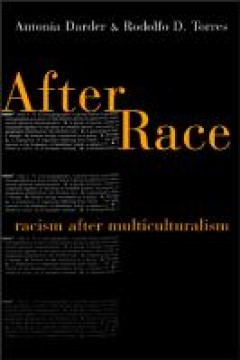
After Race
After Race pushes us beyond the old "race vs. class" debates to delve deeper into the structural conditions that spawn racism. Darder and Torres place the study of racism forthrightly within the context of contemporary capitalism. While agreeing with those who have argued that the concept of "race" does not have biological validity, they go further to insist that the concept also holds little p…
- Edition
- -
- ISBN/ISSN
- 9780814782682
- Collation
- -
- Series Title
- -
- Call Number
- -

A Future History of Water
Based on fieldwork among state officials, NGOs, politicians, and activists in Costa Rica and Brazil, A Future History of Water traces the unspectacular work necessary to make water access a human right and a human right something different from a commodity. Andrea Ballestero shows how these ephemeral distinctions are made through four technolegal devices—formula, index, list and pact. She arg…
- Edition
- -
- ISBN/ISSN
- 9781478004516
- Collation
- 258 hlm
- Series Title
- -
- Call Number
- -

A Commentary on the Council of Europe Convention on Action against Traffickin…
This comprehensive Commentary provides the first fully up-to-date analysis and interpretation of the Council of Europe Convention on Action against Trafficking in Human Beings. It offers a concise yet thorough article-by-article guide to the Convention's anti-trafficking standards and corresponding human rights obligations.
- Edition
- -
- ISBN/ISSN
- 978 1 78811 155 3
- Collation
- 552 hlm
- Series Title
- -
- Call Number
- -
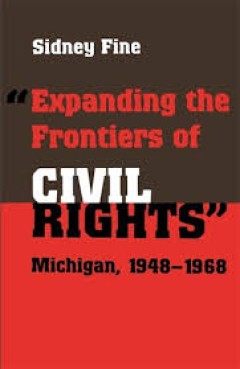
"Expanding the Frontiers of Civil Rights": Michigan, 1948-1968
Although historians have devoted a great deal of attention to the development of federal government policy regarding civil rights in the quarter century following World War II, little attention has been paid to the equally important developments at the state level. Few states underwent a more dramatic transformation with regard to civil rights than Michigan did. In 1948, the Michigan Committee …
- Edition
- -
- ISBN/ISSN
- 9780814343296
- Collation
- -
- Series Title
- -
- Call Number
- -

Voicing Consent = Sex Workers, Sexual Violation and Legal Consciousness in Cr…
This open access book draws on an international research project, using extensive and multiple methods to explore unwanted sexual contact and violence in sex work populations. A project delivered by a large team of sex workers, peer researchers, and academics, and with practitioner input over a four-year period, the central question they explore is: how do social, legal, and judicial contexts s…
- Edition
- -
- ISBN/ISSN
- 9783031777158
- Collation
- XX, 270hlm; ill., lamp.,
- Series Title
- -
- Call Number
- -
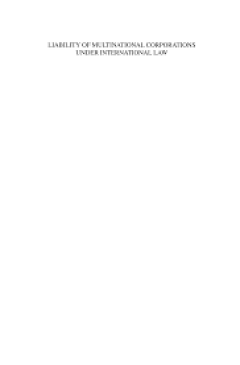
Liability of Multinational Corporations under International Law
- Edition
- -
- ISBN/ISSN
- 978-90-04-48267-8
- Collation
- 432 pp.
- Series Title
- Studies and Materials on the Settlement of International Disputes, Volume: 7
- Call Number
- -
- Edition
- -
- ISBN/ISSN
- 978-90-04-48267-8
- Collation
- 432 pp.
- Series Title
- Studies and Materials on the Settlement of International Disputes, Volume: 7
- Call Number
- -
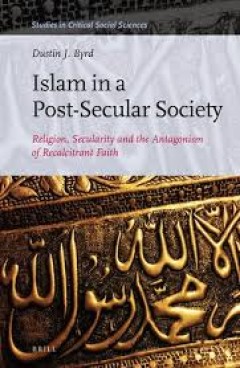
Islam in a Post-Secular Society : Religion, Secularity and the Antagonism of …
Islam in the Post-Secular Society: Religion, Secularity and the Antagonism of Recalcitrant Faith critically examines the unique challenges facing Muslims in Europe and North America. From the philosophical perspective of the Frankfurt School’s Critical Theory, this book attempts not only to diagnose the current problems stemming from a marginalization of Islam in the secular West, but also to…
- Edition
- -
- ISBN/ISSN
- 978-90-04-32855-6
- Collation
- xx, 334 pp.
- Series Title
- Studies in Critical Social Sciences, Volume: 98
- Call Number
- -

International Law and Chemical, Biological, Radio-Nuclear (CBRN) Events : Tow…
The volume investigates to what extent the international and European Union legal frameworks applicable to Chemical, Biological and Radio-Nuclear (CBRN) events are adequate to face current challenges. It is innovative in many aspects: it adopts an all-hazard approach to CBRN risks, focusing on events of intentional, accidental and natural origin; it explores international obligations according …
- Edition
- -
- ISBN/ISSN
- 978-90-04-50799-9
- Collation
- -
- Series Title
- -
- Call Number
- -
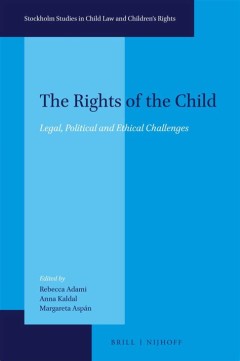
The Rights of the Child = Legal, Political and Ethical Challenges
How can human rights for children born outside their national jurisdiction with parents deemed as terrorists be safeguarded? In what ways do children risk being discriminated in their welfare rights in Sweden when treated as invisible part of a family? How can we do research on children’s rights in not just ethically sensitive ways but also with respect for children as rights subjects? And wh…
- Edition
- -
- ISBN/ISSN
- 9789004511163
- Collation
- 240 hlm; ill., lamp.,
- Series Title
- Stockholm Studies in Child Law and Children’s Rights, Volume: 7
- Call Number
- -
 Computer Science, Information & General Works
Computer Science, Information & General Works  Philosophy & Psychology
Philosophy & Psychology  Religion
Religion  Social Sciences
Social Sciences  Language
Language  Pure Science
Pure Science  Applied Sciences
Applied Sciences  Art & Recreation
Art & Recreation  Literature
Literature  History & Geography
History & Geography